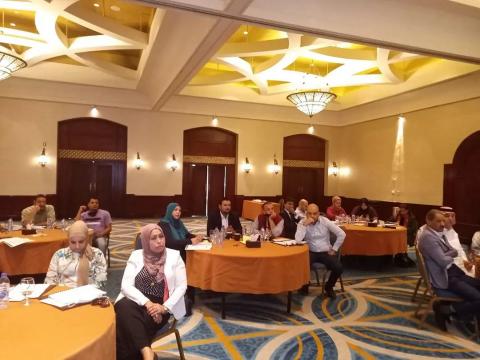

Today, Tuesday, the activities of the training workshop on integrating the population dimension and gender in municipal plans started, which is implemented by the Higher Population Council with the support of the United Nations Population Fund, and targets managers of development units in a group of selected Jordanian municipalities.
The main objectives that last for three-day of training workshop are, to provide participants with practical skills to integrate the demographic and gender into the plans of their municipalities, and to link them to the sustainable development goals and the commitments of the Population and Development Conference, in order to achieve justice in providing services to members of society (environmental level and institutional level).
Through the rehabilitation and capacity-building of the target groups in the field of strategic planning responsive to the demographic dimension and gender, sustainable development goals and gender equality at the local level, in addition to providing participants with the skills of preparing proposals for community projects with a quick impact to achieve local planning and budgets that take into account the demographic dimension and gender.
The Director of the Programs Unit at the Higher Population Council, Dr. Sawsan Al-Da`jah, stressed that this workshop stems from the pioneering role played by the Council and its belief in the importance of linking population issues with issues of economic and social development and gender issues at the national and local levels, indicating that the population and their growth rate are the focus of attention of all countries of the world. This interest has increased with increasing its repercussions on achieving sustainable development goals and indicators, especially in the twentieth century.
Al-Daajah pointed out that the most important problems that facing sustainable development are: achieving human well-being, as the continued high rates of population growth will greatly affect sustainable development in the future, indicating that the issues of demographic transition, such as the change in the age structure of the population and population growth rates, that considered one of the most important issues of interest to any country that seeks to achieve the social welfare of its citizens and enable them to obtain the necessities of a decent life, Which leads to the achievement of comprehensive national economic and social development, as Jordan's interest in achieving the well-being of its citizens crystallized through what was embodied in the axes of Jordan's Vision 2025, whose rules were laid down by His Majesty King Abdullah II bin Al Hussein.
She explained that the relationship between population and development is an interactive relationship, as the number of the country's population, its growth rates, demographic and economic characteristics, and its geographical distribution affect the potential for development in general, and the opportunities to improve the quality of life and reduce poverty, which makes it difficult for many countries to break out of the vicious circle. Indicating that the population increase leads to weak development and an increase in poverty rates on the one hand, and on the other hand, the environment in which development is absent and poverty increases in which the rates of population increase rise.
Al-Dajjah pointed out that since the middle of the last century, Jordan has witnessed fundamental changes in all aspects of society, especially in the demographic aspects that were subject to rapid changes in the elements of population growth, which led to the transition of the population in Jordan from high reproductive levels to lower levels, and formed in their totality is an indicator towards approaching the demographic transition phase and the consequent demographic opportunity that is characterized by a substantial decrease in the proportion of children under the age of 15 in the population, and a significant increase in the proportion of the population at productive ages, one of the most important conditions of which is the continued decline in reproductive rates, And the Kingdom will not be exposed to new waves of immigration.
The training program for the workshop includes several axes that focused mainly on the concept and importance of the strategic thinking strategy, through the development of the thinking process and the connection of the thinking process with reality, strengthening thinking patterns, generating ideas and enhancing patterns of positive behavior accompanying thinking, in addition to the strategic analysis that includes identifying needs (problem, or need), by analysis and identification of the problem/goal, the SWOT system for implementing strategic analysis, and the strategic direction (strategic direction matrix).
The workshop also deals with strategic planning, focusing on building the purpose, goal, initiatives, defining timeframes and responsibilities, and managing the strategy, which included resource management, personnel management, follow-up, evaluation processes and measuring strategic impact, in addition to the issue of the need for the project proposal, its construction and writing skills.







